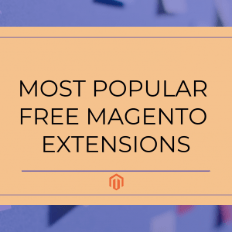Overwhelmed by all the eCommerce solutions available in the marketplace?
No wonder you’re puzzled when comparing one eCommerce software to another! This is a difficult and technical task, and even the experts’ opinions differ on these matters. So, which eCommerce solutions should you select for your enterprise?
How do You Know Which eCommerce Solutions are Best for Your Enterprise
If you’re ready to build a website that will make you reach an extraordinary growth level, then bear with us! This guide presents the aspects you need to consider to pick the best shopping cart software! Simplify the decision-making process, and choose what’s best for your company!
Stick around to learn:
- What is the top 3 eCommerce Platforms for large retailers, and what they offer
- What are the differences in features between Magento, BigCommerce & Shopify
- How can you tell which eCommerce solution is best for your enterprise
Check out our previous blog posts to learn what experts say about migrating to Magento. It also includes the steps you need to make before and after the Magento migration.
Continue reading to discover what makes Magento Enterprise Edition the best fit for large retailers!
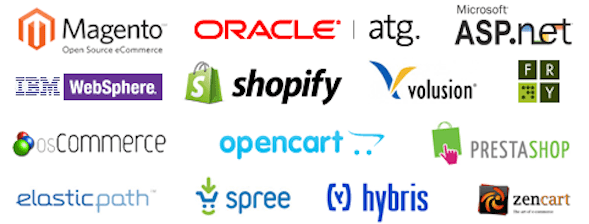
eCommerce Platforms – Image Source: outbrain.com
Here’s a checklist of what is required to do before purchasing a new eCommerce CMS for your website:
1.1. List your Business Requirements
Before purchasing an eCommerce software, state what your business’ requirements are. With this, you can briefly identify which platform fits you best.
Think about the future of your business and ask yourself how much do you want to expand it.
An eCommerce expert can help you decide what front-end requirements your website needs to have. These include the functionalities, the look, search & other features that your users see. With this, you can provide a user-friendly environment for your customers.
Address the back office and software integration issues. State all the capabilities you expect from an eCommerce platform. This will help you to list your products in a user-friendly manner and provide an extraordinary shopping experience. Aim to simplify as much as you can the process of going from chart to complete order, and diminish the number of steps during the shopping checkout. This will help you avoid the situations when the users abandon the cart, and it will increase your conversion rate.
Discuss with an eCommerce website developer the following aspects of your chosen platform:
- The site architecture
- The security and reliability features
- The customer and catalog management features
- How scalable, performant, and sophisticated do you need it to be?
- Cat it handle big traffic?
- Is it mobile responsive?
- Can it easily process a large number of catalog pages without slowing down the load page time?
- Does it have a caching solution integrated so that the loading speed of your website can’t be affected?
- Does it offer you the proper environment to handle advanced transactions?
- Does it have a friendly user interface?
- Does it provide the tools to build an appealing shopping environment for your customers?
1.2. Estimate Your Budget
For an enterprise-level eCommerce website, you will also need a development budget. You also need a hosting solution and other specialized services. These services can have a direct impact on your sales performance, such as SEO services. For more details on how to calculate your development and hosting costs, read our previous blog post: How Much Does It Cost to Build a Magento Website.
1.3. Research for an eCommerce solution
The third and biggest step you will make is to search for eCommerce platform providers.
To narrow down your options, try Google search what your competitors are using.
The goal is to find an affordable, fully-customizable, and easy-to-use software that can meet your business needs. Aim for a solution that can help you provide a pleasant shopping experience for your customers. To reduce the time and effort of being up to date with the latest trends on eCommerce, it is advisable to consult an eCommerce development expert. They will give suggestions on which eCommerce software you should use to receive a great ROI.
2. Top 3 eCommerce Platforms for Large Retailers

eCommerce Platforms for Big Retailers – Image Source: magenticians.com
What if you don’t have the time, the energy, or the technical proficiency in evaluating what eCommerce solution can serve your enterprise best? Well, you are about to find out what the top three options are for big retailers who choose to run their businesses online.
The top evaluates each framework. It highlights the potential each of them is capable of adding to your company to help your sales performance grow.
2.1. Magento Enterprise Edition
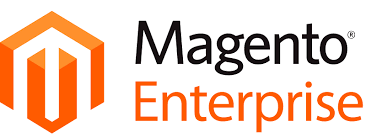
Magento EE – Image Source: g2crowd.com
Magento Enterprise Edition is a derived version of Magento Community Edition. It is built by open-source technology. This means that every merchant can customize the looks, feel, and functionalities of their store. It is also known as Magento Commerce (On-Premises). The enterprise edition software has additional features and functionalities to the open-source version, Magento Community version.
The software provides a flexible, scalable eCommerce environment to grow your business. It was specially designed for large retailers that need technical support. This support is in terms of installation, configuration, customization, and troubleshooting.
Magento EE comes in two versions, and the latest versions of the software are EE 1.14.2.4 and EE 2.1.7. However, installing a Magento EE 1x version is not available anymore since November 2015, when Magento 2 was launched. The companies that already use the 1x versions can renew their license until 2018. The annual fee starts from $18,000 and includes the latest features, performance updates, and support.
After 2018, however, all Magento 1x merchants had to be upgraded to Magento 2. The good news is that Magento 2 has a new way to calculate the license cost. This is based on a revenue model that says that the more revenue you have, the lower the fee you need to pay to Magento to cover the fixed license costs. Find out more in our dedicated blog post on Magento Enterprise Edition costs. A study commissioned by Magento and delivered by Forrester Consulting interviewed five Magento merchants to obtain data with respect to costs, benefits, and risks. The report shows the following results of switching from other platforms to Magento Enterprise Edition.
According to the report, merchants also mentioned the following. These are the qualitative benefits of using Magento Enterprise Edition:
- Scalability and stability: to support the maximum traffic volume and meet all their business demands. This is while providing a pleasant and secure shopping environment for their customers
- Flexibility: to improve their website’s functionality, such as SEO, site management, marketing, payment, and shipping features and the opportunity to add more features to their website that improved their sales and explore cross-selling opportunities, such as customer ratings, refer to a friend feature.
- Business expenses reduction: the purchase of Magento EE software removed the software license fees associated with other eCommerce platforms in terms of annual maintenance or other fees.
However, the downside of all these aspects refers to the maintenance part of the Magento EE platform. It sometimes needs a more laborious intervention from experienced developers.
To find out more about the development costs of Magento EE, check out “The Ultimate Handbook on Magento Pricing in 2020”.
Other Magento EE advantages:
- Content staging and preview so that every Magento merchant can make updates without a developers help or expertise
- Strong support from the community. It also includes a large ecosystem of experts, developers, and designers. You have access to third-party extensions and professional help.
- Flexibility in terms of the deployment environment. This includes Magento cloud or third-party hosting solutions
- Varnish page caching system that can greatly improve the response time of the website and reduce the load on servers
- A highly customizable shopping environment and through extensions and modules
- Great architecture and security features. These offer merchants a stable and customizable service interface.
- Analytics and reporting features that can help you gain fruitful and valuable insights. You can follow reports of your user’s online activity on your web store through the admin mode
- SEO features, such as automatically-generated sitemaps. Also, the opportunity to create search engine friendly URLs
- Site and content management that can help you control multiple stores from one admin
You’ll find out more about the advantages and benefits of using Magento in the last chapter of this guide.
2.2. BigCommerce
BigCommerce for Enterprises – Image Source: bigcommerce.com
BigCommerce is another enterprise-level eCommerce platform that large retailers use. It helps them enjoy an advanced suite of tools to attract more traffic and business growth.
The Enterprise version starts from $1,000 per month. It offers a selection of 100 free website templates and a series of paid templates customized to suit any type of brand.
The software comes with inbuilt tools that can help you maximize your conversion rate. It helps customers find what they need to buy and a one-page checkout procedure.
All these features will help you decrease the cart abandonment rates and improve your sales performance.
Special features:
- Abandoned cart recovery
- Dynamic filters
- Robust product search capabilities
- Customer-level Analytics in real-time that allows merchants to evaluate how their customers act
- Reporting capabilities and a complete suite of actionable data and insights. This can help you win back your lost customers, identify underperforming products and increase your revenue
- A full suite of integration that can extend the capability of the online store, from inventory and accounting to email marketing
- Advanced security and protection so that the customers can confidently make transactions
- Good infrastructure that ensures an optimal page load time and responsiveness for users from all around the world
- Enterprise clients have non-stop site monitoring and priority support
However, BigCommerce for enterprises has its downsides, too. One is that there are fewer free templates available, and the paid ones are more expensive than is the case with other eCommerce platforms. More than this, because it is a newer platform, BigCommerce has a smaller community than Magento. If you’re already using BigCommerce, check out our dedicated blog post on the tools and services you can use to easily migrate from BigCommerce to Magento!
2.3. Shopify Plus

Shopify Plus – Image Source: shopify.com
Shopify Plus – an upgraded version of Shopify – is another option that big companies use to make their products and services available for their online target audience. It is a great solution for medium-sized companies that want to take their business to the next level. The platform provides enterprise-level features, hosting, and other capabilities that can help your website handle high user traffic, process a large number of catalog pages and a big number of orders at the same time. Shopify Plus also offers complete and dedicated account management and non-stop support for all their merchants. The software’s price depends on a series of factors, such as the size of your company, your sales rates and volume, and the annual revenue growth rate your business records. The cost of the platform starts at $2,000 per month. Notable features:
- It provides a fully hosted, fully supported environment for all merchants
- Easily customizable to fit any type of business
- Email marketing and customer rewards programs integrated
- User-friendly interface, easy to navigate and manage
- A variety of third-party applications through a large community of users and developers
- Unlimited bandwidth for increased traffic and sales
- Responsive designs and optimized for all devices
- Integrated hosted solution and server maintenance services
- Multichannel capabilities through POS and other social selling features
As with BigCommerce, Shopify Plus has a series of disadvantages, such as:
- It lacks content management area, which means that you cannot have the same subdomain for your website and your eCommerce store
- Has backend integration limitations
- It is not capable of handling the requirements of a global enterprise company
- Has limited promotion capabilities
- A limit of 100 attributes for product features
- Lack of B2B capabilities for the out of the box version of the software
Do you want to migrate from Shopify to Magento? Learn what tools you can use to make the switch!
3. Enterprise eCommerce Platforms & Softwares Comparison
3.1. Bigcommerce vs. Magento Enterprise
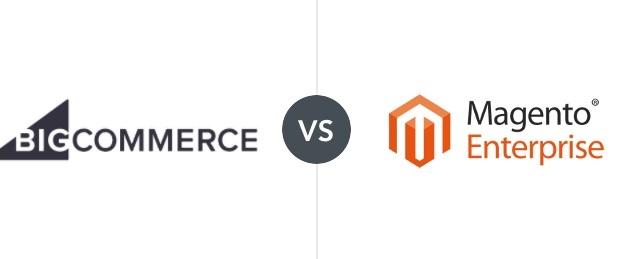
Magento vs. BigCommerce – Image Source: google.com
Popularity and Ease of Use
Magento EE is the most flexible and versatile platform that offers all the freedom you need to customize your shop and provide an outstanding shopping environment for your customers.
Yet, you must know from the start that changing Magento’s appearance and improving its functionality requires some technical skills and programming experience.
In this sense, you can consider hiring a Magento developer to offer your customers an unrivaled shopping experience.
By contrast, BigCommerce is easier to manage, and it offers the tools and functionalities you need to set-up and operate an online store.
BigCommerce is a better choice for companies that aren’t prepared to invest in development and are searching for a simpler interface.
Thus, BigCommerce is easier to use, and it offers a good shopping environment for all merchants. But if you want a superior and more sophisticated solution, investing in Magento EE will be worthwhile in the long term.
Security
Magento is famous for its most secure shopping mediums available in the marketplace. With Magento, you can enjoy the help of a big community of developers that make constant changes to the software. Thus, you’ll have access to updates that you can install to improve your web store’s security and offer a much safer environment for your clients. BigCommerce also provides a good level of security and an integrated hosting solution with a domain name. BigCommerce certified servers offer you protection from many threats. These include credit card data breaches, intrusion detection, fraudulent transaction software. It also provides DDOS mitigation through third-party solutions.
SEO Features
BigCommerce offers many advanced SEO features and customization options that can raise your website ranking in search engines.
Both Magento and BigCommerce have SEO capabilities and offer SEO friendly options to help you reach your target audience faster and easier. However, when it comes to social media, BigCommerce is more flexible than Magento.
Yet, there are plenty of integrations and applications that you can use with Magento to provide social sharing and following buttons on your website.
You can also create promotions and offer different sales options to your customers with Magento’s built-in features. Check out our dedicated blog post on how to optimize your Magento eCommerce Site’s SEO if you want to learn new ways of making your site more user and search-friendly.
Conclusion
Both platforms are valuable solutions for enterprise-level companies, but they serve different requirements:
- With Magento, you can have unrestricted access to create a spectacular and fully customizable website that serve your client’s needs,
- BigCommerce is a simpler option for those who do not need customizations and need a fast launch for their website
3.2. Shopify Plus vs. Magento Enterprise

Magento EE vs. Shopify Plus – Image Source: Google.com
Popularity and Ease of Use
Magento EE is the leading eCommerce software, with nearly 8.7% of large retailers around the world using it. By contrast, Shopify Plus’ market share is a bit smaller, at 8.4%, but it gained a lot of popularity in the last years.
These two enterprise eCommerce solutions offer different options to their customers:
- Shopify Plus provides fully hosted and non-stop support for their merchants. They serve different marketing necessities and business requirements. In this sense, small to mid-sized retailers choose Shopify Plus as a fast solution to launch their business online
- Mid-sized to big-sized companies choose Magento instead. This helps them reach a much bigger target audience and aspire at a higher number of traffic and sales
Both Magento and Shopify provide a powerful CMS and an appealing user-interface. They both have lots of options you can use to customize your website’s appearance.
When it comes to ease of use, Shopify is more user-friendly, while Magento is more flexible, which means that it is more customizable. To use Magento, you’ll need to have the necessary technical skills or hire a specialist to do the job for you.
With Shopify, you don’t need any programming skills. Your website will have a much simpler appearance, and the level of customization will be limited.
Security
As we mentioned above, Magento is one of the safest eCommerce environments. This is due to the fact that you have all the flexibility you need to handle the security level of your website.
With Magento EE, you can build a website as robust and secure as you want it to be. If you go for Shopify Plus, all the responsibility is passed to Shopify, from SSL encryption to Level 1 PCI DSS compliant. Thus, Shopify will run your website in a secure environment without your intervention.
SEO Features
Magento offers all the options you need to improve your website’s functionality that can also help boost your website ranking in the search engines. You can also have the same powerful SEO features available in Shopify Plus: the option to edit your meta titles, meta descriptions, URL, the alt tag for images, and customize image file names, generate sitemap.xml, and robots.txt files.
Still, there are other practices you can use to improve your website’s organic traffic and make your website appear higher in SERP. Check out our dedicated post on how to optimize your eCommerce Site’s SEO if you want to make your site search friendly and attract more customers!
Conclusion
Taking into account that Magento is more customizable, has more complex features, more powerful security solutions, and support departments, it is a safer choice in the long run.
It is also the right fit for large retailers that want to build a powerful brand online, aim for a wider audience, and expect higher traffic and increased sales performance.
In the end, the right choice will be the one that fits the type and size of your business. Thus, Shopify Plus is a good choice if you’re looking for a solution that has faster implementation time, and it’s cheaper to maintain.
What truly matters is to take into consideration your needs and requirements so that the final choice can help your business thrive.
5.What Big Companies Use Magento Enterprise?
Magento holds the largest ecosystem of commerce technology partners. They have more than 205,000 experienced developers that endorse Magento as the most feature-rich, scalable, and customizable enterprise platform that modern technology can offer.
These are the main reasons Magento merchants give for using the software, making it easy for the rest to see why Magento holds more enterprise-level companies than any other platform available in the marketplace.
Here are some statistical data to show the prevalence of Magento in the year 2020:
Magento Enterprise Customers – Source: W3tech.com

Plus, Magento proved to be a successful eCommerce solution, at a global level, for many branded manufacturers.
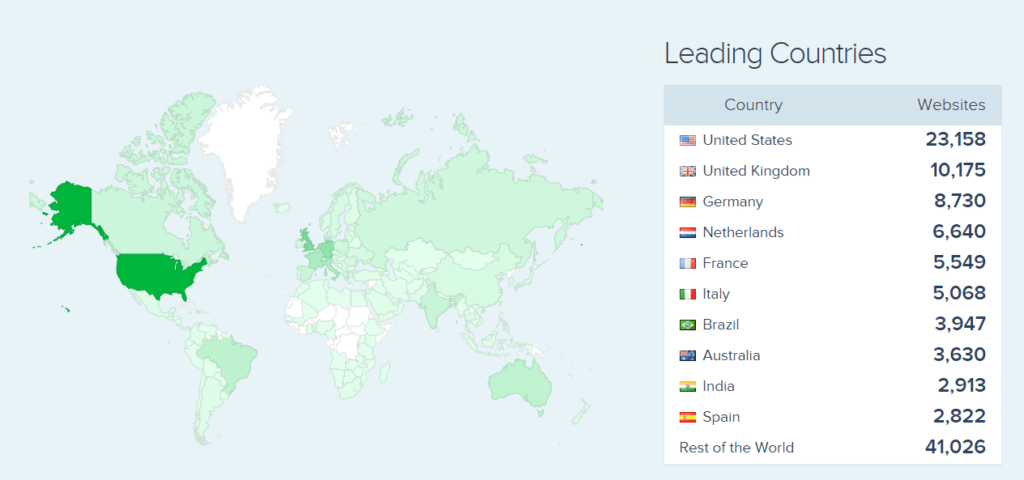
Magento usage by country – Source: Similar Tech
6. Conclusion: What Is the Best eCommerce Software Choice for Large Companies?
Finding a new eCommerce solution is a tremendous and risky job, as every bad step you take can waste your time, money, and the opportunity to increase your sales. When it comes to choosing the best enterprise platform, it all boils down to what is the right fit for your business. In this sense, you can consider some aspects along the following lines:
- Are you willing to invest in website development or just want an out-of-box and ready to launch a solution?
- Do you want to benefit from a sophisticated eCommerce web store?
- Does your business need complex features to handle more advanced transactions?
- Do you prefer a user-friendly user interface?
Having these aspects in view, here are what your decisions depend on. Your decision depends on your unique business requirements, your marketing goals, and the budget you are willing to invest. Fortunately, there is the right solution for every type of business to attract more customers and make them convert! When you’re trying to be ahead of the competition, the looks and feel of your website are not enough to make your target audience choose your website over other results in Google. You also need to be able to offer a secure, easy to browse, and appealing shopping environment for your customers.
From the moment they have reached your web page until they check out, and even after that! You need to make them come back again and again to increase the average transaction size and the frequency of transactions per customer. They will help your business flourish. For all these purposes, Magento EE proved to be the most reliable platform for enterprises. It was specially designed for large retailers and businesses such as yours! Developing a Magento website is a more complex job compared to other eCommerce solutions. The benefits you’ll receive using this platform make it worthwhile. So you can reach an exceptional return on your investments!
If you want to learn more about the advantages of migrating to Magento and the steps you should follow to make a move, check out our blog post on Magento Migration Guide: How to Move Your Shop to the World’s Leading eCommerce Platform. But if you are already convinced, then you can proceed to the next step of hiring a developer. This can transform your marketing plans into accomplishments! Call us today, and let’s discuss eCommerce solutions at an affordable price on the biggest eCommerce platform in the world!


